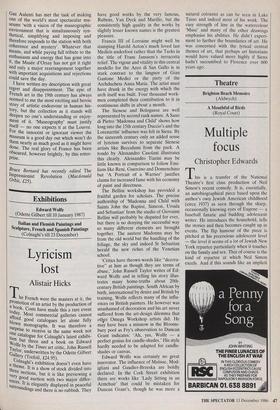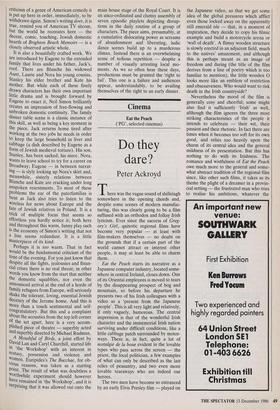Theatre
Brighton Beach Memoirs (Aldwych) A Mouthful of Birds (Royal Court)
Multiple focus
Christopher Edwards
This is a transfer of the National Theatre's first class production of Neil Simon's recent comedy. It is, essentially, an autobiographical piece based upon the author's own Jewish American childhood (circa 1937) as seen through the sharp, occasionally knowing eyes of Eugene — a baseball fanatic and budding adolescent writer. He introduces the household, tells the stories and then becomes caught up in events. The flip humour of the piece is pitched at his precocious adolescent level — the level it seems of a lot of Jewish New York repartee particularly when it touches on the family and sex. That of course is the kind of repartee at which Neil Simon excels. And if this sounds like an implicit criticism of a genre of American comedy it is put up here in order, immediately, to be withdrawn again. Simon's writing does, it is true, remind you of American TV sitcom, but the world he recreates here — the decent, comic, touching, Jewish domestic hearth of Brighton Beach Memoirs — is a closely observed artistic whole.
It is also a beautifully crafted work. We are introduced by Eugene to the extended family that lives under his father, Jack's, roof. There are Blanche his widowed Aunt, Laurie and Nora his young cousins, Stanley his elder brother and Kate his mother. But while each of these finely drawn characters has their own important little drama and is brought forward by Eugene to enact it, Neil Simon brilliantly creates an impression of free-flowing and unbroken domestic continuity. The family dinner table scene is a classic instance of this skill, as well as being a key moment in the piece. Jack returns home tired after working at the two jobs he needs in order to keep the large household in liver and cabbage (a dish described by Eugene as a form of Jewish medieval torture). His son, Stanley, has been sacked; his niece, Nora, wants to leave school to try for a career on Broadway; Eugene — in between narrat- ing — is slyly looking up Nora's skirt and, meanwhile, sisterly relations between Blanche and Kate are cracking under long unspoken resentments. To most of these problems the ear of the paterfamilias is bent as Jack also tries to listen to the wireless for news about Europe and the fate of Jewish relatives in Poland. It is a trick of multiple focus that seems so effortless you hardly notice it; both here and throughout this warm, funny play such is the economy of Simon's writing that not a line seems redundant. It is a little masterpiece of its kind.
Perhaps it is too warm. That in fact would be the fundamental criticism of the tone of the evening. For you just know that despite all the fights, jealousies and finan- cial crises there is no real threat; in other words you know from the start that neither the domestic squabbles, nor even the announced arrival at the end of a horde of family refugees from Europe, will seriously shake the tolerant, loving, essential Jewish decency of the Jerome home. And this is more than a touch sentimental and self- congratulatory. But this and a complaint about the acoustics from the top left corner of the set apart, here is a very accom- plished piece of theatre — superbly acted and superbly directed by Michael Rudman. A Mouthful of Birds, a joint effort by David Lan and Caryl Churchill, started life in the Workshop' with an interest in ecstasy, possession and violence and Women. Euripides's The Bacchae, for ob- vious reasons, was taken as a starting Point. The result of what was doubtless a worthwhile experiment should however have remained in 'the Workshop', and it is surprising that it was allowed out onto the main house stage of the Royal Court. It is an unco-ordinated and clumsy assembly of seven episodic playlets depicting disrup- tions in the daily routine of a group of characters. The piece aims, presumably, at a cumulative dislocating power as screams of abandonment and liberating, ludic dance scenes build up to a murderous climax. Instead there is an overwhelming sense of tedious repetition — despite a number of visually arresting local mo- ments. As we so often hear these days, productions must be granted the 'right to fail'. This one is a failure and audiences appear, understandably, to be availing themselves of the right to an early dinner.



































































 Previous page
Previous page